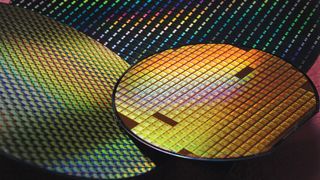CHIPS Act could mean cheaper laptops for all - but not for a few years
$52 billion of the Act’s funding will go to subsidizing semiconductor production

On Tuesday the 9th of August, 2022, US President Joe Biden signed the CHIPS and Science Act into law, bringing a staggering two hundred and eighty billion dollarinos of state funding for the Department of Energy, the National Science Foundation, and most importantly, the American semiconductor industry.
For those unaware, ‘CHIPS’ stands for ‘Creating Helpful Incentives to Produce Semiconductors’, an acronym that one imagines a congressional intern somewhere is extremely proud of. Introduced to the House by Ohio Democrat Tim Ryan in 2021, the CHIPS Act aims to counter rising production of semiconductors in China and Taiwan, amidst the global shortage that has seen price hikes for a lot of computer-related hardware in the past two years.
Post-COVID, the semiconductor industry has boomed once again, with high demand making major manufacturers (such as TSMC) push to open more foundries and churn out more chips. While the chip manufacturing industry might have been birthed on American soil, outsourcing to Asian nations has become increasingly common, and this latest move is no doubt driven by concern that the US has been slowly losing its industry stake over the past three decades.

What does CHIPS mean for manufacturers?
$52 billion of the CHIPS Act’s allocated funds has been earmarked specifically for investing in semiconductor manufacturing within the United States, and major players such as Intel are expected to take advantage of this. Although the specifics of the bill were argued over for months in the House and Senate, the Act was passed (with some amendments) by a bipartisan majority.
SIA, the Semiconductor Industry Association, immediately praised the act even before President Biden signed it into law. Major players in the semiconductor industry also responded positively, although there have been some concerns over provisions in the act that will hamper companies’ manufacturing efforts in other countries.
It’s important to note that Intel stands to win the most here, since it manufactures its own chips (like Micron) and already has existing plans to open factories in Arizona and Ohio. Other companies, like AMD and Nvidia, rely on partner firms to actually mass-produce the chips they design, which would see the act’s funding and tax benefits have a lesser impact on them directly.

More importantly: what does CHIPS mean for us?
Here's the deal: America invented semiconductors.But after American manufacturing was hollowed out, we let semiconductors go overseas.Today, we bring microchip building – and the jobs that come with it – home. pic.twitter.com/xroL1SNzyKAugust 9, 2022
The bottom line here is simple: if semiconductor production is significantly stepped up across America in the next few years, the price of the best laptops, desktop PCs, even phones and tablets is likely to decrease. Biden proudly declared on Twitter that ‘today, we bring microchip building – and the jobs that come with it – home’. It’s a strong message, and if all goes to plan, it’s one that will pay dividends.
Get daily insight, inspiration and deals in your inbox
Get the hottest deals available in your inbox plus news, reviews, opinion, analysis and more from the TechRadar team.
With our increasing reliance on technology for our everyday lives, owning not just one but multiple devices is becoming the norm. A phone, a laptop, a smartwatch - all powered by the semiconductors that the US government wants to produce. With more control over manufacturing and the right investments and incentives, the cost of creating a laptop and getting it into the hands of an American consumer is going to drop - and we’d like to hope the price tag will drop with it.
Now, this doesn’t mean you’re going to suddenly see cut-price Intel Evo laptops at Walmart next week. There are new factories to be built, new processors to be designed, and new devices to manufacture. It’s a slow-burning move, but the Biden administration is wise to cast its eyes ahead; it looks like foundry plans that commence work this year will be well-suited to meet rising demand in a year or two, just in time for the Democrats to point out their good work as the 2024 election looms.
It’s hard to gauge the exact impact the CHIPS Act will have right now, because the subsidies it offers haven’t been handed out yet. But our tech-loving brains are telling us that more funding for tech production - in any country, for that matter - is a very good thing, and we’ll see the benefits once the groundwork has been laid.
In fact, the EU is planning its very own Chips Act (just Chips, no acronym here) for 2024, too, in a further challenge to China’s dominance of the industry. The Chinese government, perhaps unsurprisingly, isn’t too happy with the move, but some Asian manufacturers are evidently intrigued by the prospect of subsidized development in the US.

Christian is TechRadar’s UK-based Computing Editor. He came to us from Maximum PC magazine, where he fell in love with computer hardware and building PCs. He was a regular fixture amongst our freelance review team before making the jump to TechRadar, and can usually be found drooling over the latest high-end graphics card or gaming laptop before looking at his bank account balance and crying.
Christian is a keen campaigner for LGBTQ+ rights and the owner of a charming rescue dog named Lucy, having adopted her after he beat cancer in 2021. She keeps him fit and healthy through a combination of face-licking and long walks, and only occasionally barks at him to demand treats when he’s trying to work from home.
Most Popular

